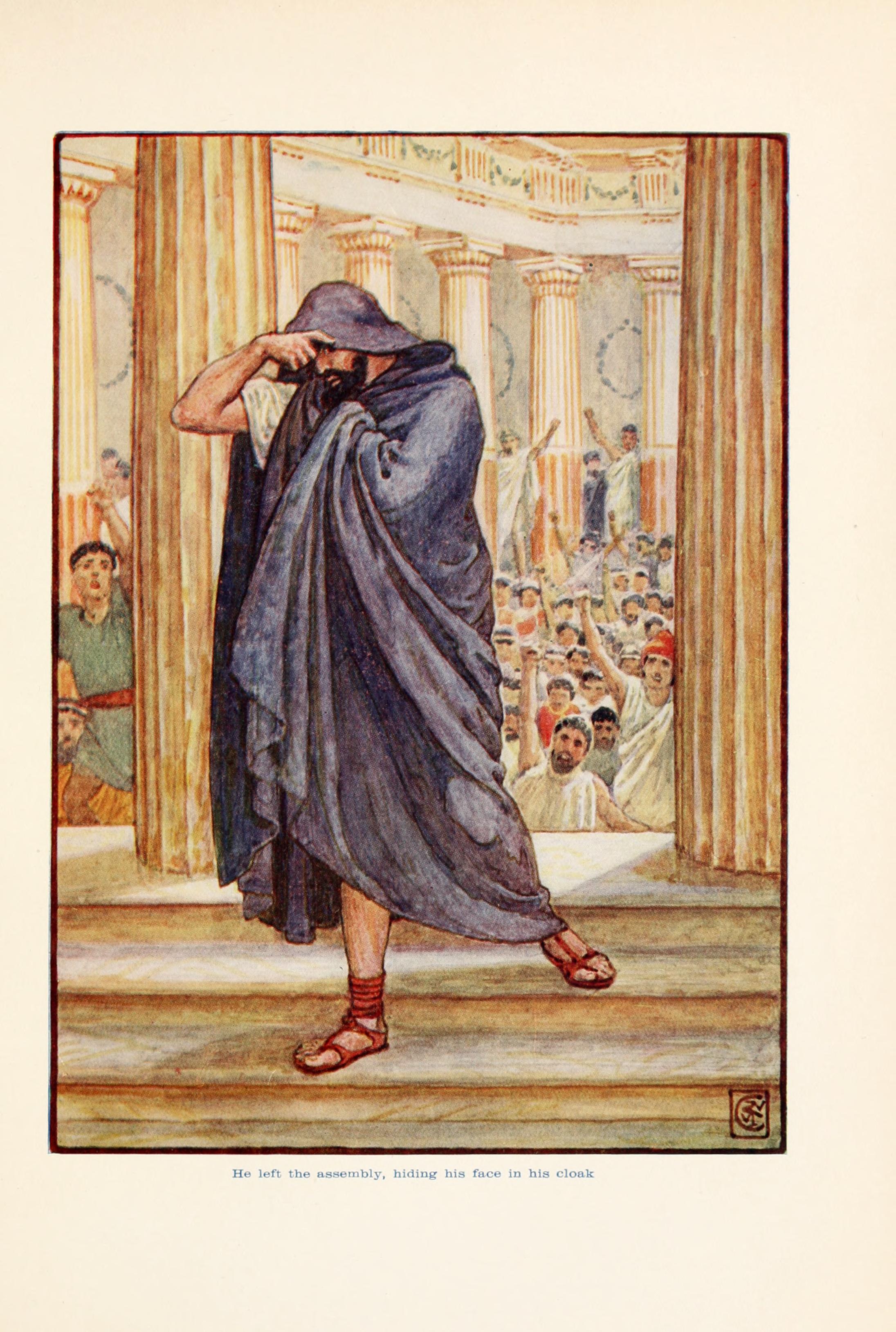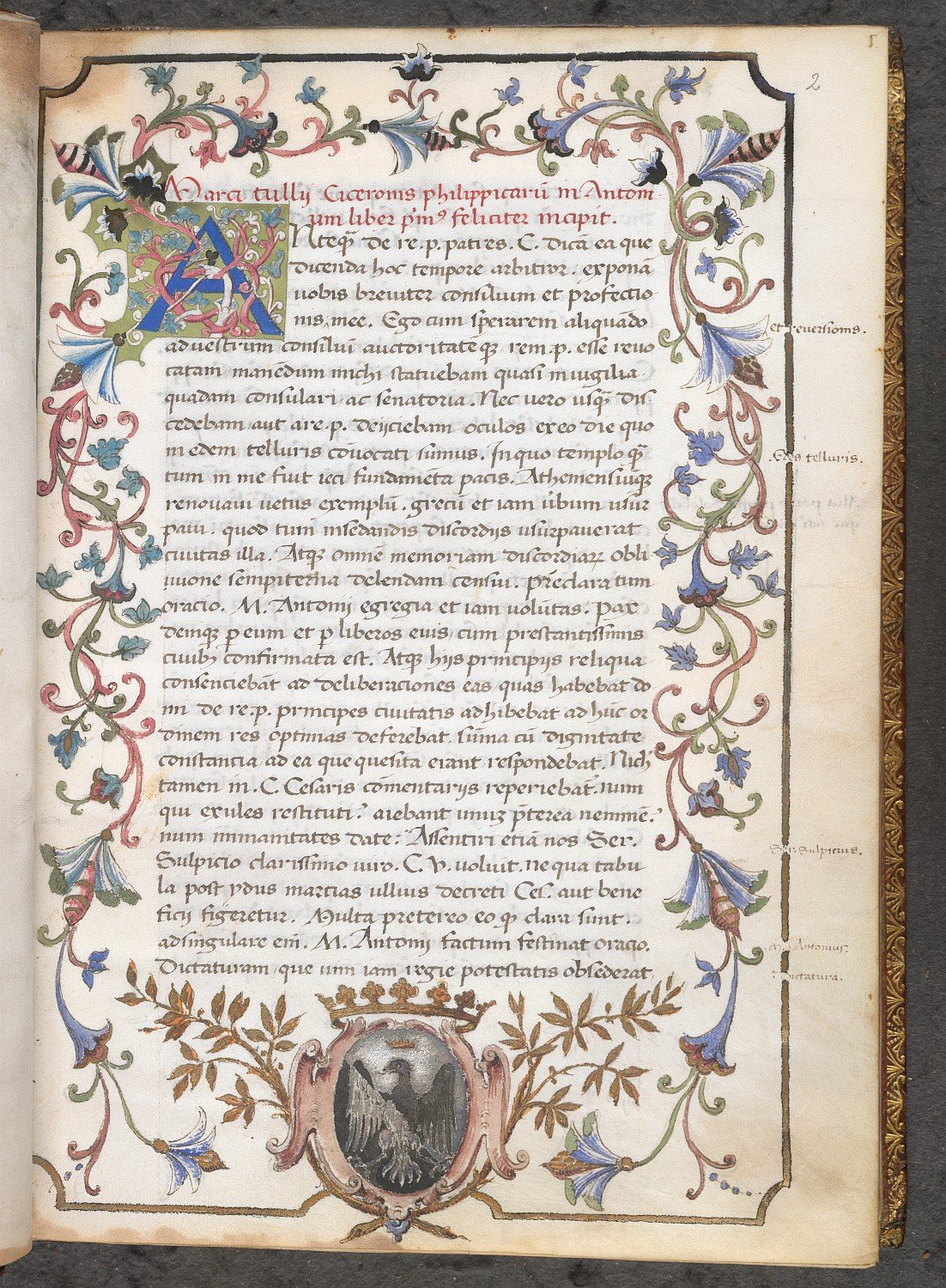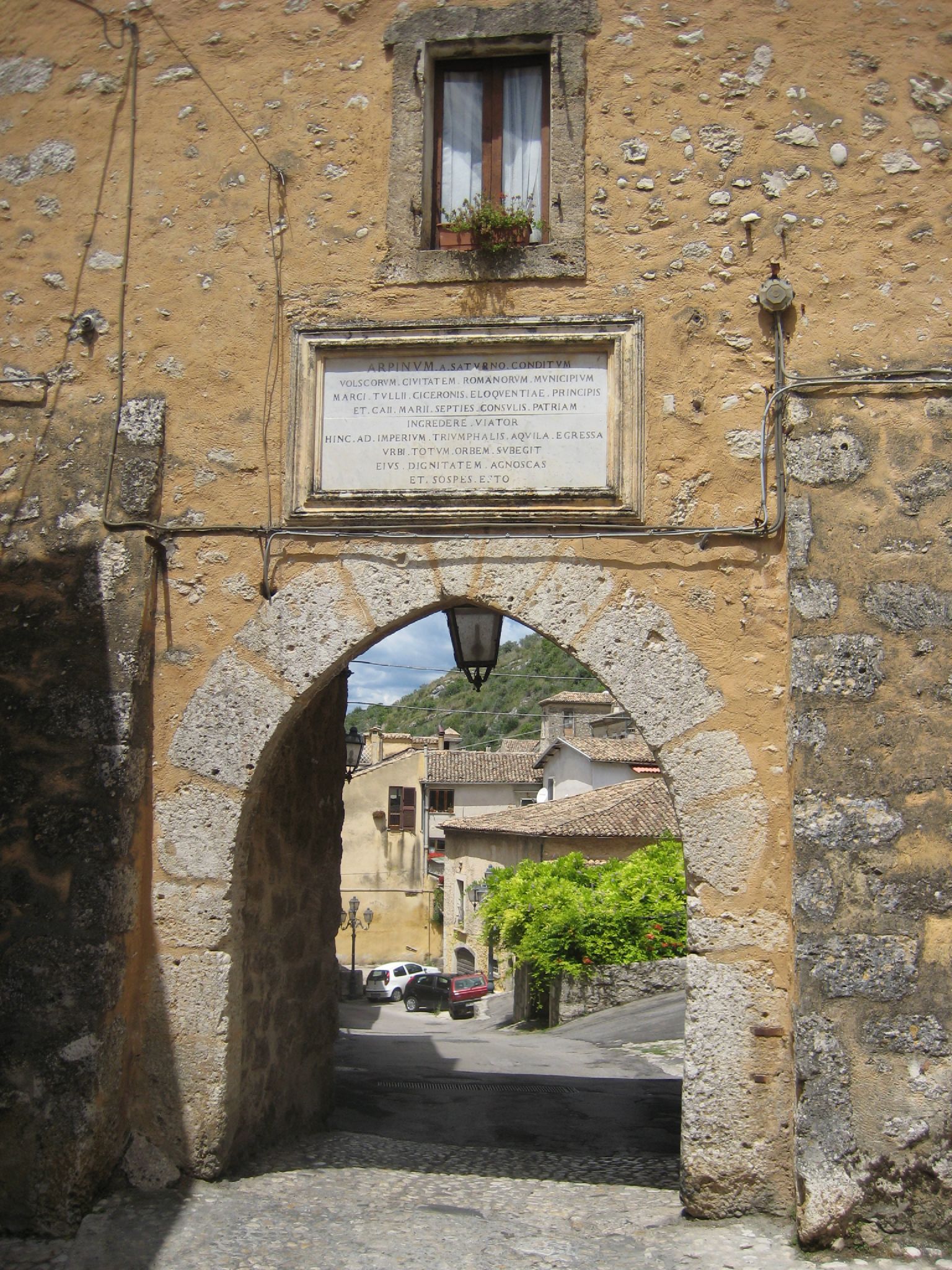|
Philippic
A philippic ()http://www.collinsdictionary.com/dictionary/English/philippic is a fiery, damning speech, or tirade, delivered to condemn a particular political actor. The term is most famously associated with two noted orators of the ancient world: Demosthenes of ancient Athens and Cicero of ancient Rome. The term itself is derived from Demosthenes' speeches in 351 BC denouncing the imperialist ambitions of Philip of Macedon, which later came to be known as ''The Philippics''. Greece The original "philippics" were delivered by Demosthenes, an Athenian statesman and orator in Classical Greece, who delivered several attacks on Philip II of Macedon in the 4th century BC. A First, Second, and Third Philippic have been ascribed to Demosthenes. A Fourth Philippic is also extant, but is of disputed authorship. Rome Cicero consciously modeled his own condemnations of Mark Antony on Demosthenes's speeches, and if the correspondence between Marcus Junius Brutus the Younger and Cicero is ... [...More Info...] [...Related Items...] OR: [Wikipedia] [Google] [Baidu] |
Demosthenes Orator Louvre
Demosthenes (; el, Δημοσθένης, translit=Dēmosthénēs; ; 384 – 12 October 322 BC) was a Greek statesman and orator in ancient Athens. His orations constitute a significant expression of contemporary Athenian intellectual prowess and provide insight into the politics and culture of ancient Greece during the 4th century BC. Demosthenes learned rhetoric by studying the speeches of previous great orators. He delivered his first judicial speeches at the age of 20, in which he successfully argued that he should gain from his guardians what was left of his inheritance. For a time, Demosthenes made his living as a professional speechwriter ( logographer) and a lawyer, writing speeches for use in private legal suits. Demosthenes grew interested in politics during his time as a logographer, and in 354 BC he gave his first public political speeches. He went on to devote his most productive years to opposing Macedon's expansion. He idealized his city and strove ... [...More Info...] [...Related Items...] OR: [Wikipedia] [Google] [Baidu] |
Demosthenes
Demosthenes (; el, Δημοσθένης, translit=Dēmosthénēs; ; 384 – 12 October 322 BC) was a Greek statesman and orator in ancient Athens. His orations constitute a significant expression of contemporary Athenian intellectual prowess and provide insight into the politics and culture of ancient Greece during the 4th century BC. Demosthenes learned rhetoric by studying the speeches of previous great orators. He delivered his first judicial speeches at the age of 20, in which he successfully argued that he should gain from his guardians what was left of his inheritance. For a time, Demosthenes made his living as a professional speechwriter ( logographer) and a lawyer, writing speeches for use in private legal suits. Demosthenes grew interested in politics during his time as a logographer, and in 354 BC he gave his first public political speeches. He went on to devote his most productive years to opposing Macedon's expansion. He idealized his city and stro ... [...More Info...] [...Related Items...] OR: [Wikipedia] [Google] [Baidu] |
Philippicae
The ''Philippics'' ( la, Philippicae, singular Philippica) are a series of 14 speeches composed by Cicero in 44 and 43 BC, condemning Mark Antony. Cicero likened these speeches to those of Demosthenes against Philip II of Macedon; both Demosthenes’s and Cicero's speeches became known as Philippics. Cicero's Second Philippic is styled after Demosthenes' ''De Corona'' ('On the Crown'). The speeches were delivered in the aftermath of the assassination of Julius Caesar, during a power struggle between Caesar's supporters and his assassins. Although Cicero was not involved in the assassination, he agreed with it and felt that Antony should also have been eliminated. In the Philippics, Cicero attempted to rally the Senate against Antony, whom he denounced as a threat to the Roman Republic. The Philippics convinced the Senate to declare Antony an enemy of the state and send an army against him. However, the commanders were killed in battle, so the Senate's army came under the co ... [...More Info...] [...Related Items...] OR: [Wikipedia] [Google] [Baidu] |
Third Philippic
The "Third Philippic" was delivered by the prominent Athenian statesman and orator, Demosthenes, in 341 BC. It constitutes the third of the four philippics. Historical background In 343 BC, the Macedonian arms were carried across Epirus and a year later Philip II of Macedon turned his military activities towards Thrace.Demosthenes, ''Third Philippic''17 When the Macedonian army approached Chersonese, the Athenians became anxious about the future of their colony. An Athenian general, Diopeithes, ravaged the maritime district of Thrace, an offensive resulting in Philip's rage. The king sent a letter of remonstrance to Athens, demanding the immediate withdrawal of the Athenian troops from Cardia, which was occupied by the Macedonian army.Demosthenes, ''Third Philippic''35 Because of this turbulence, the assembly convened and Demosthenes delivered "On the Chersonese", convincing the Athenians, who would not recall Diopeithes. Content of the speech Within the same year, Demosthenes del ... [...More Info...] [...Related Items...] OR: [Wikipedia] [Google] [Baidu] |
Second Philippic
The "Second Philippic" is an oration that was delivered by the Athenian statesman and orator Demosthenes between 344–343 BC. The speech constitutes the second of the four philippics the orator is said to have delivered. Historical background In 344 BC, Demosthenes barnstormed Peloponnese,Demosthenes,''Second Philippic''19 in order to detach as many cities as possible from Macedon's influence. Nonetheless, his mission mainly failed, since most of the Peloponnesians saw Philip as the guarantor of their continued freedom and independence.T. Buckley, ''Aspects of Greek History 750-323 BC'', 480. They did not consider that the freedom of Greece was directly linked with the Athenian power, especially as the Athenians were allies of the Spartans. Thereby, Philip and certain Peloponnesian cities, including Argos, Messinia and Arcadia, sent a joint embassy to Athens to express their grievances. Athens' position was tough, since they wanted to keep their friendship with Sparta, but, at the s ... [...More Info...] [...Related Items...] OR: [Wikipedia] [Google] [Baidu] |
Fourth Philippic
The ''Fourth Philippic'' is a speech attributed to the Athenian statesman and orator, Demosthenes and given in 341 BC. It constitutes the last of the four philippics. Modern scholars, however, consider that the speech is not Demosthenes' work and may be attributed to Anaximenes of Lampsacus who frequently wrote imagined dialogues or speeches for real figures. If it was a genuine Demosthenic speech, it is likely that it was issued in pamphlet form rather than actually delivered as a speech. Historical background In 341 BC, when the embassy for which Demosthenes is calling in his fourth Philippic is sent to the Persians, Philip of Macedon is angry. Yet, the Persians reject the embassy. Content of the speech In the Fourth Philippic, Demosthenes asks that money be sent because of an upcoming war with Macedon. He calls for Athens to send an embassy to the Persians. It includes two significant passages copied from Demosthenes' earlier ''On the Chersonese'' and ''Second Philippic'' speec ... [...More Info...] [...Related Items...] OR: [Wikipedia] [Google] [Baidu] |
Pro Ligario
Marcus Tullius Cicero ( ; ; 3 January 106 BC – 7 December 43 BC) was a Roman statesman, lawyer, scholar, philosopher, and academic skeptic, who tried to uphold optimate principles during the political crises that led to the establishment of the Roman Empire. His extensive writings include treatises on rhetoric, philosophy and politics, and he is considered one of Rome's greatest orators and prose stylists. He came from a wealthy municipal family of the Roman equestrian order, and served as consul in 63 BC. His influence on the Latin language was immense. He wrote more than three-quarters of extant Latin literature that is known to have existed in his lifetime, and it has been said that subsequent prose was either a reaction against or a return to his style, not only in Latin but in European languages up to the 19th century. Cicero introduced into Latin the arguments of the chief schools of Hellenistic philosophy and created a Latin philosophical vocabulary w ... [...More Info...] [...Related Items...] OR: [Wikipedia] [Google] [Baidu] |
Marcus Tullius Cicero
Marcus Tullius Cicero ( ; ; 3 January 106 BC – 7 December 43 BC) was a Roman statesman, lawyer, scholar, philosopher, and academic skeptic, who tried to uphold optimate principles during the political crises that led to the establishment of the Roman Empire. His extensive writings include treatises on rhetoric, philosophy and politics, and he is considered one of Rome's greatest orators and prose stylists. He came from a wealthy municipal family of the Roman equestrian order, and served as consul in 63 BC. His influence on the Latin language was immense. He wrote more than three-quarters of extant Latin literature that is known to have existed in his lifetime, and it has been said that subsequent prose was either a reaction against or a return to his style, not only in Latin but in European languages up to the 19th century. Cicero introduced into Latin the arguments of the chief schools of Hellenistic philosophy and created a Latin philosophical vocabulary ... [...More Info...] [...Related Items...] OR: [Wikipedia] [Google] [Baidu] |
Mark Antony
Marcus Antonius (14 January 1 August 30 BC), commonly known in English as Mark Antony, was a Roman politician and general who played a critical role in the transformation of the Roman Republic from a constitutional republic into the autocratic Roman Empire. Antony was a relative and supporter of Julius Caesar, and served as one of his generals during the conquest of Gaul and the Civil War. Antony was appointed administrator of Italy while Caesar eliminated political opponents in Greece, North Africa, and Spain. After Caesar's assassination in 44 BC, Antony joined forces with Marcus Aemilius Lepidus, another of Caesar's generals, and Octavian, Caesar's great-nephew and adopted son, forming a three-man dictatorship known to historians as the Second Triumvirate. The Triumvirs defeated Caesar's killers, the ''Liberatores'', at the Battle of Philippi in 42 BC, and divided the government of the Republic between themselves. Antony was assigned Rome's eastern provinces, includi ... [...More Info...] [...Related Items...] OR: [Wikipedia] [Google] [Baidu] |
First Philippic
The "First Philippic" was delivered by the Athenian statesman and orator Demosthenes between 351 BC-350 BC. It constitutes the first speech of the prominent politician against Philip II of Macedon. Historical framework Since 357 BC, when Philip seized Amphipolis, after agreeing in part to trade it for Pydna, Athens was formally in a state of war against the King of Macedon. In 352 BC, Demosthenes characterised Philip as the very worst enemy of his city,Demosthenes, ''Against Aristocrates''121 and a year later he criticized fiercely those dismissing Philip as a person of no account and warned them that he is as dangerous as the King of Persia.Demosthenes, ''For the Liberty of the Rhodians''24 In 352 BC, the Athenian troops opposed Philip successfully at Thermopylae,Demosthenes, ''On the False Embassy''319 but the same year the Macedonian army campaigned in Thrace and won a decisive victory over the Phocians in Thessaly, an event that shook the orator. At the same period that the King ... [...More Info...] [...Related Items...] OR: [Wikipedia] [Google] [Baidu] |
Second Triumvirate
The Second Triumvirate was an extraordinary commission and magistracy created for Mark Antony, Marcus Aemilius Lepidus, and Octavian to give them practically absolute power. It was formally constituted by law on 27 November 43 BC with a term of five years; it was renewed in 37 BC for another five years before expiring in 32 BC. Constituted by the ''lex Titia'', the triumvirs were given broad powers to make or repeal legislation, issue judicial punishments without due process or right of appeal, and appoint all other magistrates. The triumvirs also split the Roman world into three sets of provinces. The triumvirate, formed in the aftermath of a conflict between Antony and the senate, emerged as a force to reassert Caesarian control over the western provinces and wage war on the ''liberatores'' led by the men who assassinated Julius Caesar. After proscriptions, purging the senatorial and equestrian orders, and a brutal civil war, the ''liberatores'' were defea ... [...More Info...] [...Related Items...] OR: [Wikipedia] [Google] [Baidu] |
Augustus
Caesar Augustus (born Gaius Octavius; 23 September 63 BC – 19 August AD 14), also known as Octavian, was the first Roman emperor; he reigned from 27 BC until his death in AD 14. He is known for being the founder of the Roman Principate, which is the first phase of the Roman Empire, and Augustus is considered one of the greatest leaders in human history. The reign of Augustus initiated an imperial cult as well as an era associated with imperial peace, the ''Pax Romana'' or ''Pax Augusta''. The Roman world was largely free from large-scale conflict for more than two centuries despite continuous wars of imperial expansion on the empire's frontiers and the year-long civil war known as the "Year of the Four Emperors" over the imperial succession. Originally named Gaius Octavius, he was born into an old and wealthy equestrian branch of the plebeian ''gens'' Octavia. His maternal great-uncle Julius Caesar was assassinated in 44 BC, and Octavius was named in Caesar' ... [...More Info...] [...Related Items...] OR: [Wikipedia] [Google] [Baidu] |








